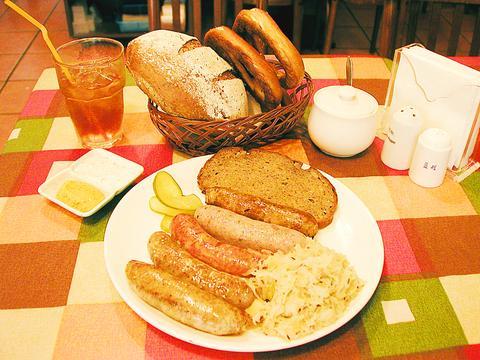In March, Taipei's two German restaurants called Schwarzwald -- one on Wenzhou Street, one on Yongkang Street -- parted ways and the Yongkang branch changed its name to Oma Ursel Cafe Restaurant and moved to Fuxing N Road, but retained its manager Chiu Dai-yu (邱岱玉) and the cooking staff, who have made it one of the few authentic German eateries in town over the past four years. The new name is a tribute to Chiu's German mother-in-law, whom she credits for teaching her everything she knows about German cuisine -- -- and one look at the menu will show that she's learned a huge amount.
Oma Ursel's tries to incorporate three elements of German food into its menu: home-style cooking of the kind taught by the restaurant's namesake, regional specialties and new flavors that have been incorporated into the national palette during recent decades. The result is a selection of dishes that is representative of current German cuisine without limiting itself to cliched Teutonic specialties.
Recently, Chiu has been enthusiastically promoting the restaurant's five choices of sausage, all of which are made on the premises. Less ambitious diners can choose two from among the bratwurst, cheese wurst, spicy wurst, white wurst and gyro wurst, or the brave can attempt all five. The stand-outs are the bratwurst and spicy wurst, while the gyro wurst in tatziki sauce is well worth a try to sample one of the flavors that Chiu said has become integral to German cuisine since the arrival of immigrants from Greece and Turkey.

PHOTO: MAX WOODWORTH, TAIPEI TIMES
Along with the sausages, diners eager for authentic fare should try the Wiener schnitzel, baked trout, or the chicken cordon bleu. This last dish is an absolute highlight, with plentiful cheese melted in the middle of the breaded, wrapped and fried chicken filet and pork. The cooks have deftly avoided over-breading to allow the flavors of the meat and cheese to come through while adding a pleasant crisp texture.
In the blazing summer months, when sausages and meats may be less appealing to some diners, the lighter fare on offer includes meal-size salads and a long list of vegetarian dishes, including the house's own vegetarian meatloaf, as well as light and low-priced lunch specials like spaetzle (fried homemade egg noodles) and seafood spaghetti. These go down especially well with a glass of Alsterwasser -- a half-and-half mix of beer and Sprite named for the lake in the center of Hamburg.
All of the restaurant's main dishes are served as set menus with decent portions of side orders that include sauerkraut, spaetzle, potato noodles or speck (braised potatoes, onions and bacon), salad, tomato and bacon soup, a slice of cake and coffee or tea. It's important to save space for the restaurant's homemade cakes, as no German meal would be complete without a slice, but you'll need the coffee (steer clear of the milk teas) or the remainder of your wheat beer to get down the apple tart, as it's quite dry.

On April 26, The Lancet published a letter from two doctors at Taichung-based China Medical University Hospital (CMUH) warning that “Taiwan’s Health Care System is on the Brink of Collapse.” The authors said that “Years of policy inaction and mismanagement of resources have led to the National Health Insurance system operating under unsustainable conditions.” The pushback was immediate. Errors in the paper were quickly identified and publicized, to discredit the authors (the hospital apologized). CNA reported that CMUH said the letter described Taiwan in 2021 as having 62 nurses per 10,000 people, when the correct number was 78 nurses per 10,000

As we live longer, our risk of cognitive impairment is increasing. How can we delay the onset of symptoms? Do we have to give up every indulgence or can small changes make a difference? We asked neurologists for tips on how to keep our brains healthy for life. TAKE CARE OF YOUR HEALTH “All of the sensible things that apply to bodily health apply to brain health,” says Suzanne O’Sullivan, a consultant in neurology at the National Hospital for Neurology and Neurosurgery in London, and the author of The Age of Diagnosis. “When you’re 20, you can get away with absolute

May 5 to May 11 What started out as friction between Taiwanese students at Taichung First High School and a Japanese head cook escalated dramatically over the first two weeks of May 1927. It began on April 30 when the cook’s wife knew that lotus starch used in that night’s dinner had rat feces in it, but failed to inform staff until the meal was already prepared. The students believed that her silence was intentional, and filed a complaint. The school’s Japanese administrators sided with the cook’s family, dismissing the students as troublemakers and clamping down on their freedoms — with

As Donald Trump’s executive order in March led to the shuttering of Voice of America (VOA) — the global broadcaster whose roots date back to the fight against Nazi propaganda — he quickly attracted support from figures not used to aligning themselves with any US administration. Trump had ordered the US Agency for Global Media, the federal agency that funds VOA and other groups promoting independent journalism overseas, to be “eliminated to the maximum extent consistent with applicable law.” The decision suddenly halted programming in 49 languages to more than 425 million people. In Moscow, Margarita Simonyan, the hardline editor-in-chief of the